Argentina has elected an academic economist as president. His battle cry? "Long live freedom, damn it!"
“The greatest danger to the State is independent intellectual criticism; there is no better way to stifle that criticism than to attack any isolated voice, any raiser of new doubts, as a profane violator of the wisdom of his ancestors. Another potent ideological force is to deprecate the individual and exalt the collectivity of society. For since any given rule implies majority acceptance, any ideological danger to that rule can only start from one or a few independently thinking individuals. The new idea, much less the new critical idea, must needs begin as a small minority opinion; therefore, the State must nip the view in the bud by ridiculing any view that defies the opinions of the mass. “Listen only to your brothers” or “adjust to society” thus become ideological weapons for crushing individual dissent. By such measures, the masses will never learn of the nonexistence of the Emperor’s clothes.” Anatomy of the State, Murray N. Rothbard
Oops, they did it again.
First Giorgia Meloni was elected prime minister of Italy. This despite the objections and smears of the self-important and seemingly all-powerful US Deep State and its Mockingbird press, which in the run-up to the Italian general election had painted her as the second coming of Benito Mussolini. Never mind that the politics of the corporatist Deep State are a lot closer to Mussolini’s fascist vision than those of Meloni, who in the “real world” pragmatically governs from center-right – to the great disappointment of many on both sides of the spectrum.
In the current US corporate media-approved version of the political spectrum, the go-to political character assassination terms “Trump-like,” “alt-right,” “far-right,” fascist, libertarian, neo-Nazi, and radical are all bundled up as synonyms, interchangeably and reflexively applied to anyone whose political beliefs are to the right of the modern embodiments of Marx and Engels’ version of socialism collectively referred to as “Woke” culture.
Each interchangeable term being repeatedly weaponized and launched in harmonized Qassam rocket barrages against non-sycophant independent thinkers, writers, politicians, scientists, or physicians who refuse to contort their speech to fit the approved narratives, gender identifiers and pretzel logic of the Globalist oligarchy.
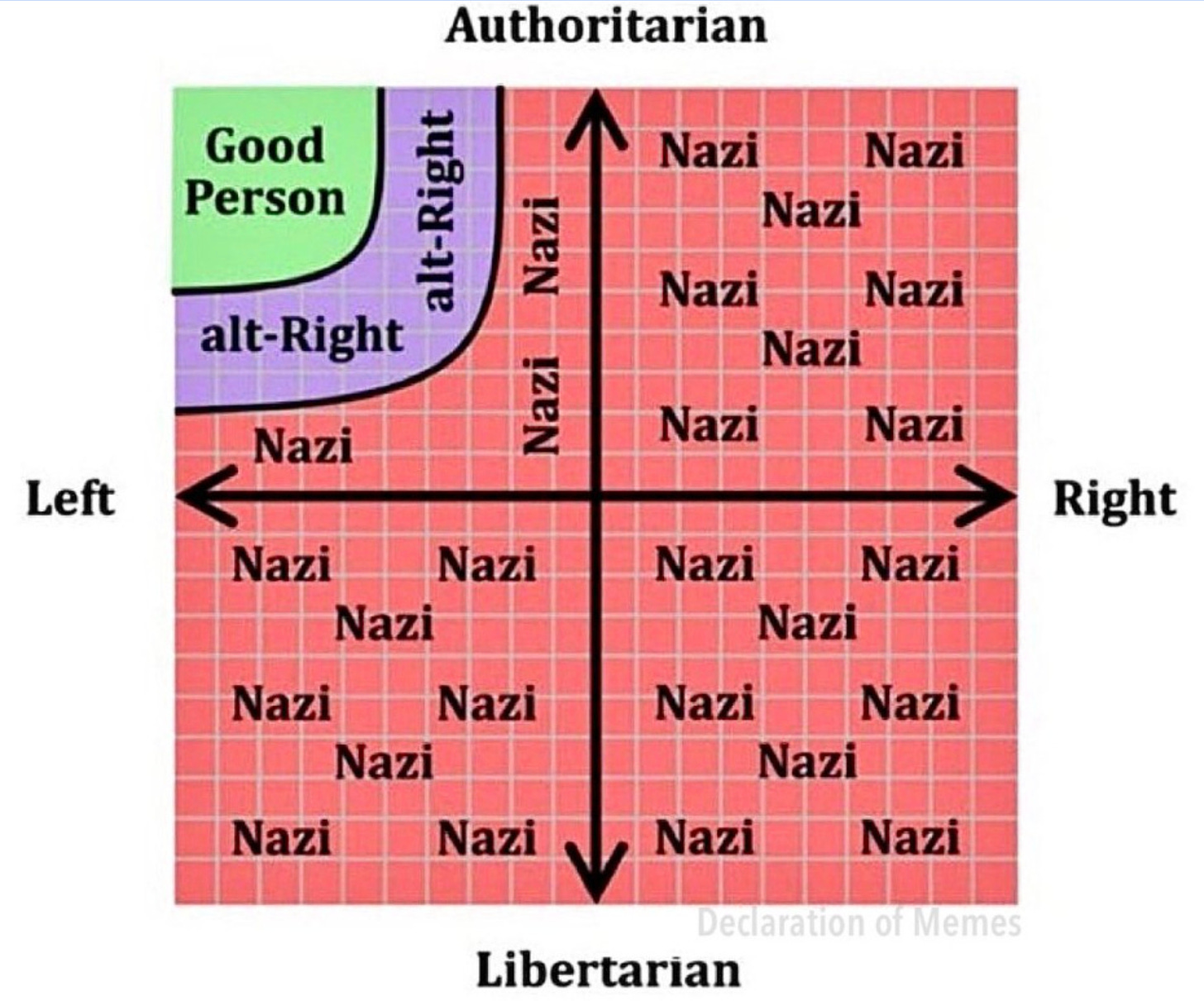
Unfortunately for those who maintain the thesaurus of approved “advocacy journalism” euphemisms, “anti-Semitic” has recently become both too inconvenient and too complicated, necessitating that it be struck from currently approved character assassination lexicon.
After decades of alternating corrupt mismanagement by the two entrenched traditional Argentine parties (Peronists vs Radicals), an academic economist of the Austrian school named Javier Milei has been elected President of Argentina, adding salt to the self-inflicted wounds of approved narrative defenders. And once again, we are predictably being gifted with the usual stream of character assassination and hate speech from Deep State corporatist media lapdogs. My, how the Mockingbird does love to sing.

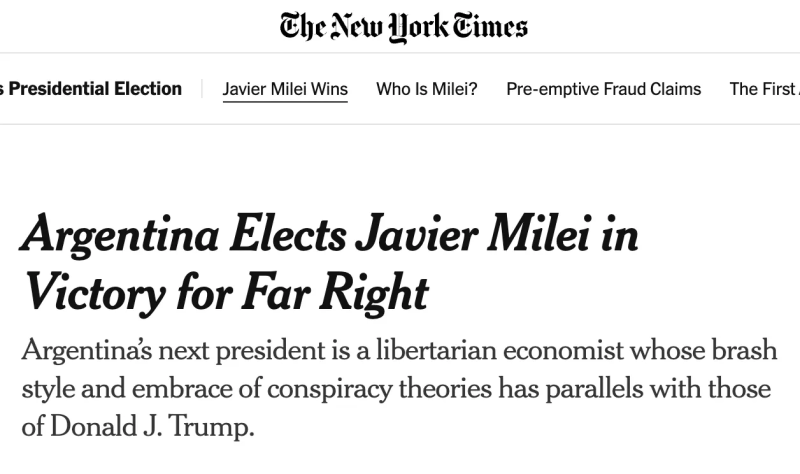
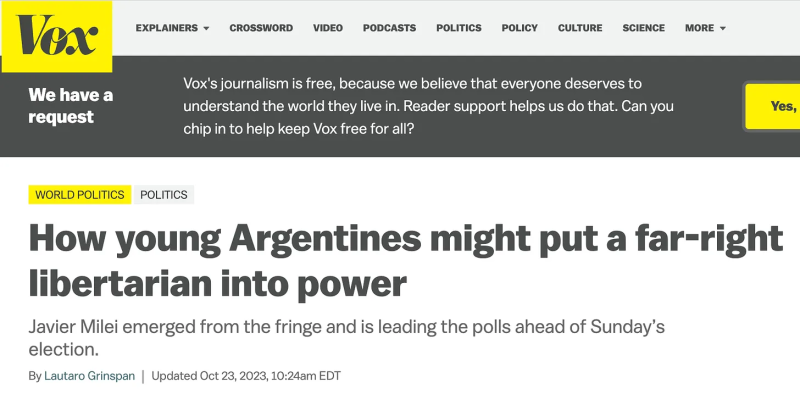
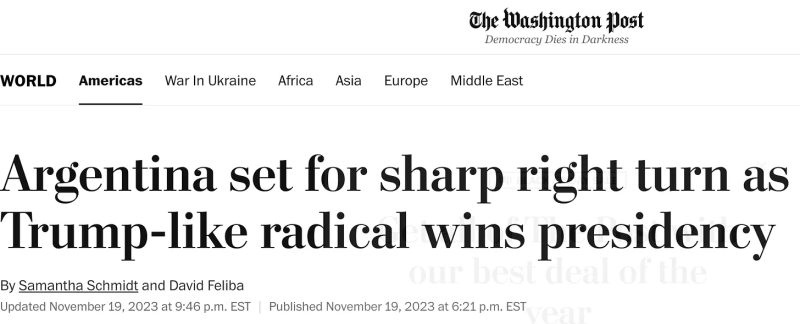
As with Meloni’s election, we have been treated to yet another peek at the Wizard behind the curtain playing his Mighty Wurlitzer. Labeling Javier Milei as a television personality, a common trope in both domestic and international corporate media, is a gross distortion of reality.
Why is Milei’s training in the Austrian School of economics relevant? Because the economic logic of the Austrian School is based on strict adherence to the idea that social phenomena result exclusively from the motivations and actions of individuals. Austrian school theorists hold that economic theory should be exclusively derived from basic principles of human action.
In other words, growth in the “wealth of nations” is the consequence of actions of the individuals which create value and wealth. The Austrian School emphasizes the importance of free markets, individualism, and minimal government intervention. It should come as no surprise that Ayn Rand highly recommended the economic writings of the Austrian school, particularly those of Ludwig von Mises. Is this starting to make sense now?
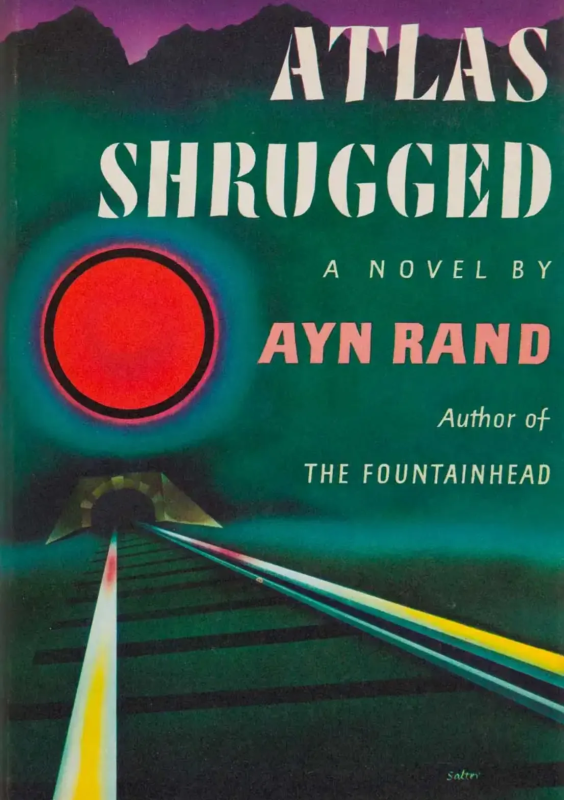
In Ayn Rand’s literary metaphor of Galt’s Gulch, the productive have fled and formed their own community, where free-market principles prevail and those who are enterprising succeed without the need for government regulation.
“We are not a state here, not a society of any kind – we’re just a voluntary association of men held together by nothing but every man’s self-interest. I own the valley and I sell the land to the others, when they want it. Judge Narragansett is to act as our arbiter, in case of disagreements. He hasn’t had to be called upon, as yet. They say that it’s hard for men to agree. You’d be surprised how easy it is – when both parties hold as their moral absolute that neither exists for the sake of the other and that reason is their only means of trade.”
(Rand, 2007, p. 748)
Dr. Milei is basically an intellectual academic who became a truth warrior in response to the damage he saw being done to his country by a parasitic administrative state. In other words, he is yet another intellectual critic who is mad as hell and not going to take it anymore.
He graduated with a degree in economics from the University of Belgrano, and continued on to obtain a masters degree and doctorate in economics from the Instituto de Desarrollo Economico y Social and Torcuato di Tella University. For over twenty years he taught University-level courses in macroeconomics, economic growth, microeconomics, and mathematics for economists, and authored several books in economics and politics.
His signature presidential campaign rallying cry has been “Long live freedom, damn it!” coupled with criticism of the “thieving and corrupt political class” of Argentina. Austrian school logic formulated as populism for the masses. Labeling Dr. Milei as Trump-like is clearly a gross oversimplification.
In his 1973 classic The Machinery of Freedom, David Friedman outlines his vision of an anarchist society. Anarcho-capitalists forcefully reject paternalism, i.e., the view that people must be forcibly protected from themselves. The only enforceable claim people have against others is to be left alone. Like all anarchists, Friedman objects to the existence of the state, which he says is distinguished from a criminal gang only by the psychological fact that “most people treat government coercion as normal and proper”.
Don’t cry for Argentina, a once and future jewel and the second largest South American country, which is endowed with an embarrassment of natural resource wealth. Whose assets have been mismanaged for decades by a parasitic and dysfunctional government, resulting in widespread economic devastation. During the 19th century the country enjoyed an almost-unparalleled increase in prosperity, resulting in early 20th century Argentina becoming the seventh-wealthiest nation in the world. In 1896, Argentina’s GDP per capita surpassed that of the United States, and the country was consistently in the global economic top ten until at least 1920.

Argentina remained among the 15 richest countries until the meteoric mid-century rise to the Presidency of a previously unknown minor military leader named Juan Perón. This political earthquake was followed by a cascade of bad management, political, social, and economic upheaval, USG meddling, and a notorious “dirty war” of the State against dissident citizens.
Now, after decades of high government spending and economic stagnation, despite abundant natural resources, Argentina has become one of the poorest countries in the world. A case study in how a prosperous modern economy can be strangled by an overbearing and corrupt administrative state bureaucracy. Sound familiar?
Dr. Javier Milei leads the “La Libertad Avanza” (Liberty Advances) coalition, and has vowed to “put an end to the parasitic and useless political caste that is destroying this country”. His parties’ campaign has broken the mold of traditional Argentine politics by focusing heavily on social media, particularly TikTok and YouTube, where he developed a strong following among younger supporters.
“Today, the reconstruction of Argentina begins” he confidently asserted, as historic election results poured in. “Argentina’s situation is critical. The changes our country needs are drastic. There is no room for gradualism, no room for lukewarm measures.” “Argentina will return to the place in the world which it should never have lost.”

Local native speakers have a slightly different translation-

No wonder the US Deep State and its Mockingbird media are out to draw blood from this charismatic populist economist. One who dares to combine alternative social media presence with attacks on a parasitic and useless political caste. The elite members of the Atlantic Council and the Council on Foreign Relations must be wetting themselves. Time to let slip the dogs of the censorship-industrial complex, and to watch the Wikipedia and Google ranking manipulation begin. Don’t forget the popcorn.
The truth is that they should be running for their stockpile of Depends. For Austrian school economist Milei self-identifies as an anarcho-capitalist. Not as a “Trump-like,” “alt-right,” “far-right,” fascist, libertarian, neo-Nazi radical. As such, Milei happens to be at the leading edge of a growing contrarian intellectual movement which directly challenges the legitimacy of the administrative state. One which has now grown to the point where it can no longer be dismissed as “a small minority opinion,” and has been catapulted onto the world stage by an independent Latin American nation with nothing to lose and everything to gain.
I kept reading and hearing the term “anarcho-capitalism” pop up in edgy discussions with the various thought leaders whom I encounter in my daily random walk through the community of freedom and sovereignty advocates. Trying it out for size with various free-thinking investors, I repeatedly heard “Yes, I think that term fits the way I think about things”. So, having long ago learned to distrust Wikipedia for opinions on any freethinking ideas, I started texting others in my circle. And I struck gold with Jeffrey Tucker of Brownstone Institute.
I asked Jeffrey “So, are you an anarcho-capitalist?” He immediately replied “I’ve never called myself that. Too rationalistic and formulistic for my tastes. I just prefer freedom generally speaking, though my teacher was the creator of that term.”
Bingo. I replied “Interesting. Who is?” He simply responded “Murray Rothbard.” I came back with “OK, so now I have to look him up. Recommended reading on background?”
“Oh goodness, it’s all so much,” he replied (I can easily imagine his voice) “I kind of recoil at most of this heavy ideological stuff these days, but let me think for a moment.”
And then he threw open a new “thought” door for me to pass through. “Here is Rothbard’s view of the state as an institution” he wrote, followed by a PDF copy of the essay “Anatomy of the State.” I sent a copy over to Jill as we were boarding yet another flight across the pond, and we both started pouring through this little 58-page gem published by the Ludwig von Mises Institute. We were astounded by the ideas flowing from the pages. And suddenly it all made sense. Idea space we had been independently groping, like the blind men trying to describe an elephant, suddenly came into focus, and aspects of the Globalists’ actions and agenda took on new meaning.
“Anarchists oppose the State because it has its very being in such aggression, namely, the expropriation of private property through taxation, the coercive exclusion of other providers of defense services from its territory, and all of the other depredations and coercions that are built upon these twin foci of invasions of individual rights.”
(Rothbard, 2016)
Indeed, as captured in Dr. Milei’s vow to “put an end to the parasitic and useless political caste that is destroying this country,” at the core of Rothbard’s analysis is the thesis that the State is an insatiable economic parasite, constantly growing by feeding off of the surplus productive labor of those free sovereign individuals over which it asserts the right to govern.
If one was seeking to develop a diametrically opposed alternative to globalist “one -world government” techno-fascism, anarcho-capitalism would be a pretty good candidate in my opinion.
In the modern Brave New World which is being aggressively pushed toward a “Dark Aeon” transhumanist future at breakneck speed, the global financial and political elite find the decentralized diversity of cultures and independent nation states an inconvenient source of systemic “friction,” of inefficiency in navigating and achieving the financially optimized utilitarian, Malthusian, homogenized transhuman future which they seek in their endless quest for greater return on investment.
So what’s a nirvana and immortality-craving psychopathic oligarch to do, in striving to forever maintain wealth and global dominance? Substitute a single “harmonized” global government to resolve the messy chaos of human cultural and political diversity. Trade a complicated mix of different small parasites for one big one to rule them all. Problem solved. Those of us being parasitized will own nothing, be happy, have nowhere to go and no way to get out from under the thumb of this New World Order. What could possibly go wrong?
I submit that we have already lived through a B-grade movie version of that future during the COVIDcrisis of the last four years. You ask what could possibly go wrong with a top-down, centralized authoritarian diktat response to daily management of a globalized one-world socioeconomic system? If you do not immediately recognize the answer, than you are clearly suffering from mass formation (psychosis), and best of luck adapting to the future which is coming at you like a freight train.
Judging by the political stalemate and exploding debt which are the defining characteristics of the current US Imperial administrative state, it may already be too late to stop the out of control freight train barreling towards the DC Beltway.
As Rothbard points out, the debts of any government are canceled in the event of either revolution or foreign takeover after a lost (political or economic) war. And treaties are not contracts. The indebtedness and collapse of the British royal Tudor family consequent to a failed civil war took down the Italian Medici banking empire. Those who live by the sword often die by the sword. What fate awaits the BlackRock/Vanguard/State Street megafund if either USA or PRC/CCP default?
But meantime (back at the ranch), by monitoring this economic and political experiment involving a government influenced by anarcho-capitalistic socioeconomic theory as it runs its course in Argentina, we may be treated to a foreshadowing of the future which a post BRICS currency-West may soon encounter. Breaking up with an entrenched fiat currency will be hard. I suspect that softening the blow is one motive driving Globalist advocacy for central bank digital currencies (CBDC).
Perhaps the Mockingbird will not sing too loudly, its noisy territorial defense making it harder for freedom lovers to learn necessary lessons from this new Argentine economic experiment. Suffice to say, investment opportunities abound for those who are awake and alert.
But I have no doubt that, in stubborn non-conformity with Malthusian predictions, both hope and innovation will continue to spring eternal in the human heart.
History as a Race Between State Power and Social Power
Just as the two basic and mutually exclusive interrelations between men are peaceful cooperation or coercive exploitation, production or predation, so the history of mankind, particularly its economic history, may be considered as a contest between these two principles. On the one hand, there is creative productivity, peaceful exchange and cooperation; on the other, coercive dictation and predation over those social relations. Albert Jay Nock happily termed these contesting forces: “social power” and “State power.”
Social power is man’s power over nature, his cooperative transformation of nature’s resources and insight into nature’s laws, for the benefit of all participating individuals. Social power is the power over nature, the living standards achieved by men in mutual exchange. State power, as we have seen, is the coercive and parasitic seizure of this production—a draining of the fruits of society for the benefit of nonproductive (actually antiproductive) rulers.
While social power is over nature, State power is power over man. Through history, man’s productive and creative forces have, time and again, carved out new ways of transforming nature for man’s benefit. These have been the times when social power has spurted ahead of State power, and when the degree of State encroachment over society has considerably lessened.
But always, after a greater or smaller time lag, the State has moved into these new areas, to cripple and confiscate social power once more. If the seventeenth through the nineteenth centuries were, in many countries of the West, times of accelerating social power, and a corollary increase in freedom, peace, and material welfare, the twentieth century has been primarily an age in which State power has been catching up—with a consequent reversion to slavery, war, and destruction. In this century, the human race faces, once again, the virulent reign of the State—of the State now armed with the fruits of man’s creative powers, confiscated and perverted to its own aims.
The last few centuries were times when men tried to place constitutional and other limits on the State, only to find that such limits, as with all other attempts, have failed. Of all the numerous forms that governments have taken over the centuries, of all the concepts and institutions that have been tried, none has succeeded in keeping the State in check. The problem of the State is evidently as far from solution as ever. Perhaps new paths of inquiry must be explored, if the successful, final solution of the State question is ever to be attained.
“Anatomy of the State,” Murray N. Rothbard
republished with permission
Robert W. Malone is a physician and biochemist. His work focuses on mRNA technology, pharmaceuticals, and drug repurposing research.

